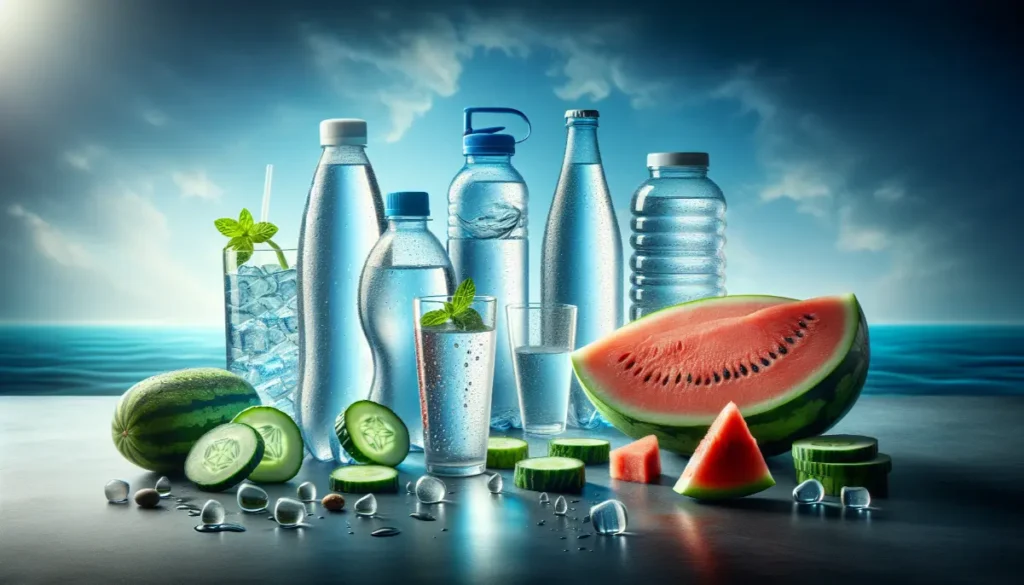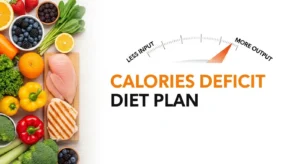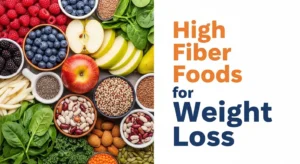Are you tired of fad diets and grueling workout routines that promise the world but deliver little? I get it. We've all been there. But what if I told you that one of the most powerful tools for achieving your goals, specifically Hydration for Weight Loss is something you already have access to: water! Yep, that's right. Staying properly hydrated can be a game-changer in your weight loss journey.

Many people overlook the simple act of drinking enough water, but it plays a crucial role in everything from boosting your metabolism to suppressing your appetite, making effective Hydration for Weight Loss a key strategy. This isn't just some trendy tip; it's backed by science! So, let's dive into the world of hydration and discover how you can use it to achieve your weight loss goals.
Key Takeaways:
- 💦 Water Works: Proper hydration can boost your metabolism and help you burn more calories.
- 🚫 Curb Cravings: Drinking water before meals can make you feel fuller, leading to reduced calorie intake.
- 💪 Fuel Your Fitness: Staying hydrated is essential for optimal exercise performance and recovery.
- 🎯 Listen to Your Body: Pay attention to your thirst cues and drink water throughout the day.
The Amazing Connection: Hydration and Weight Loss
Why Water Matters: More Than Just Quenching Thirst
Water is essential for life, and it plays a critical role in nearly every bodily function. From transporting nutrients to regulating body temperature, water is the unsung hero of our health. But how does it tie into weight loss?
- Metabolism Booster: Water helps your body burn calories more efficiently. Studies have shown that drinking water can increase your resting energy expenditure, meaning you burn more calories even when you're not active.
- Appetite Suppressant: Often, we mistake thirst for hunger. Drinking a glass of water before a meal can help you feel fuller, reducing your overall calorie intake. This is especially helpful if you struggle with overeating.
- Detoxification: Water helps flush out toxins from your body, which can improve your overall health and contribute to weight loss.
- Improved Digestion: Proper hydration is essential for healthy digestion. It helps break down food and prevents constipation, which can contribute to bloating and weight gain.
How Much Water Do You Really Need?
The old “eight glasses a day” rule is a good starting point, but the truth is, your individual needs can vary based on factors like your activity level, climate, and overall health.
Here's a general guideline:
- Women: Aim for around 9 glasses (2.2 liters) of water per day.
- Men: Aim for around 13 glasses (3 liters) of water per day.
However, it's important to listen to your body and adjust your intake accordingly. If you're exercising or living in a hot climate, you'll likely need to drink more.
Signs of Dehydration:
- Dark urine
- Dry mouth
- Headache
- Fatigue
- Dizziness
If you experience any of these symptoms, it's a sign that you need to drink more water.
Hydration Hacks: Making Water a Habit
Let's be honest, drinking enough water can be a challenge. Here are some tips to make it easier:
- Carry a Water Bottle: Keep a reusable water bottle with you at all times. This will serve as a constant reminder to drink.
- Set Reminders: Use your phone or a hydration app to set reminders to drink water throughout the day.
- Make it Flavorful: If you find plain water boring, add slices of lemon, lime, cucumber, or berries to infuse it with flavor.
- Drink Before Meals: Make it a habit to drink a glass of water before each meal.
- Swap Sugary Drinks: Replace sugary sodas and juices with water. This can significantly reduce your calorie intake.
- Eat Water-Rich Foods: Incorporate fruits and vegetables with high water content into your diet, such as watermelon, cucumber, and spinach.
Water-Rich Foods to Include in Your Diet:
| Food | Water Content (%) | Benefits |
| Watermelon | 92 | Low in calories, rich in vitamins A and C, and a great source of antioxidants. |
| Cucumber | 96 | Low in calories, hydrating, and contains vitamin K. |
| Spinach | 93 | Rich in vitamins, minerals, and fiber, which can help you feel fuller and support healthy digestion. |
| Strawberries | 92 | Low in calories, rich in vitamin C, and a good source of antioxidants. |
| Celery | 95 | Low in calories, hydrating, and a good source of fiber. |
Beyond Water: Other Hydrating Options
While water is the best choice for hydration, there are other options that can contribute to your fluid intake:
- Herbal Teas: Unsweetened herbal teas like green tea, chamomile tea, and peppermint tea are great alternatives to water. They're also packed with antioxidants.
- Infused Water: As mentioned earlier, adding fruits, vegetables, or herbs to your water can make it more appealing and flavorful.
- Sparkling Water: If you crave the fizz of soda, sparkling water is a healthier alternative. Just make sure it's unsweetened.
- Coconut Water: Coconut water is a natural electrolyte-rich beverage that can be beneficial after a workout.
Debunking Hydration Myths
There are a lot of misconceptions surrounding hydration. Let's set the record straight:
- Myth: You can only hydrate with water.
- Fact: Other fluids like herbal teas, and water-rich foods can also contribute to your hydration levels.
- Myth: You should only drink when you're thirsty.
- Fact: By the time you feel thirsty, you're already slightly dehydrated. It's important to drink water throughout the day, even if you don't feel thirsty.
- Myth: Drinking too much water is impossible.
- Fact: While rare, it is possible to overhydrate, leading to a condition called hyponatremia. This occurs when the sodium levels in your blood become dangerously low. However, this is typically only a concern for endurance athletes who drink excessive amounts of water without replenishing electrolytes.
- Myth: Coffee and tea are dehydrating.
- Fact: While caffeine has a mild diuretic effect, coffee and tea still contribute to your overall fluid intake. The hydrating benefits outweigh the diuretic effect.
The Role of Electrolytes
Electrolytes are minerals like sodium, potassium, and magnesium that help regulate fluid balance in your body. When you sweat, you lose electrolytes, which can lead to dehydration and muscle cramps.
If you're exercising intensely or for extended periods, it's important to replenish your electrolytes. You can do this by drinking sports drinks or eating electrolyte-rich foods like bananas, avocados, and leafy green vegetables.
Listen to Your Body
Ultimately, the best way to stay hydrated is to listen to your body. Pay attention to your thirst cues and drink water throughout the day. Don't wait until you're feeling parched to reach for a glass of water.
Hydration and Exercise: A Winning Combination
Boosting Performance Through Hydration
Staying hydrated is crucial for optimal exercise performance. Dehydration can lead to fatigue, muscle cramps, and decreased endurance.
- Before Exercise: Drink 16-20 ounces of water 2-3 hours before exercise.
- During Exercise: Drink 4-8 ounces of water every 15-20 minutes during exercise.
- After Exercise: Drink 16-24 ounces of water after exercise to replenish fluids lost through sweat.
Maximizing Fat Burn During Workouts
Proper hydration can also help you burn more fat during your workouts. When you're dehydrated, your body has to work harder to regulate its temperature, which can decrease your exercise intensity and fat-burning potential.
By staying hydrated, you can maintain a higher exercise intensity and burn more calories.
Electrolyte Balance for Optimal Results
As mentioned earlier, electrolytes play a crucial role in fluid balance and muscle function. When you exercise, you lose electrolytes through sweat. Replenishing these electrolytes is essential for preventing muscle cramps and maintaining optimal performance.
Consider drinking a sports drink or eating electrolyte-rich foods after a workout to replenish your electrolyte levels.
Daily Water Intake Calculator
Your recommended daily water intake is: liters.
Hydration and Mental Clarity: Sharpen Your Mind
Water's Impact on Brain Function
Dehydration can have a significant impact on your cognitive function. Studies have shown that even mild dehydration can impair your concentration, memory, and mood.
Staying properly hydrated is essential for maintaining optimal brain function and mental clarity.
Improving Focus and Concentration
When you're dehydrated, your brain has to work harder to function properly. This can lead to fatigue, difficulty concentrating, and decreased productivity.
By staying hydrated, you can improve your focus, concentration, and overall cognitive performance.
Mood Enhancement Through Hydration
Dehydration can also affect your mood. Studies have shown that dehydration can lead to irritability, anxiety, and depression.
Drinking enough water can help stabilize your mood and improve your overall sense of well-being.
“Staying hydrated is not just about physical health; it's also about mental clarity and emotional well-being.”
Practical Tips for Staying Hydrated
Setting Realistic Goals
Start by setting realistic goals for your daily water intake. Don't try to drastically increase your intake overnight. Instead, gradually increase it over time until you reach your target.
Tracking Your Progress
Use a water tracking app or a simple notebook to track your daily water intake. This will help you stay accountable and monitor your progress.
Making it a Routine
Incorporate drinking water into your daily routine. For example, drink a glass of water first thing in the morning, before each meal, and before bed.
Finding What Works for You
Experiment with different strategies for staying hydrated and find what works best for you. Some people prefer carrying a water bottle, while others prefer setting reminders on their phone.
Don't Give Up!
Staying hydrated can be a challenge, but it's worth the effort. Don't get discouraged if you slip up occasionally. Just get back on track and keep striving towards your goals.
Hydration and Overall Health: The Big Picture
Beyond Weight Loss: The Benefits of Hydration
While hydration is a powerful tool for weight loss, it also offers a wide range of other health benefits:
- Improved skin health
- Reduced risk of kidney stones
- Better joint lubrication
- Improved cardiovascular health
- Enhanced nutrient absorption
Making Hydration a Lifelong Habit
The key to reaping the long-term benefits of hydration is to make it a lifelong habit. Don't just focus on drinking enough water when you're trying to lose weight. Make it a part of your daily routine for life.
Consulting with a Healthcare Professional
If you have any concerns about your hydration levels or if you have any underlying health conditions, it's always best to consult with a healthcare professional. They can provide personalized recommendations based on your individual needs.
Conclusion: Hydration for a Healthier You
Hydration is a simple yet powerful tool that can significantly impact your weight loss journey and overall health. By understanding the connection between hydration and weight loss, incorporating practical tips into your daily routine, and making hydration a lifelong habit, you can unlock a healthier, happier you. So, grab that glass of water and start hydrating your way to success! Remember to listen to your body, stay consistent, and enjoy the journey.
And if you are looking for more ways to improve your health, check out these useful links:
1. Nagano Tonic: A Comprehensive Review
2. ProstaVive: Tackling Prostate Problems Head-On








